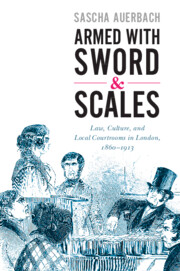'This lively social history of the London courtroom treats it as a space of encounter between the modern self and the modern state. British law-and-order values were shaped by Victorian ‘courtroom culture’ and the ordinary people - including working-class women - for whom it served as a site of both contest and community.'
Antoinette Burton - University of Illinois, Urbana-Champaign
'An authoritative and engaging study of a key institution of the modern British state, whose importance has been largely overlooked. The book takes an admirably expansive view, looking at how the stipendiary courts functioned, how they were portrayed and how they served different constituencies, including those of gender and class.'
Jennifer Davis - Emeritus Fellow, Wolfson College, University of Cambridge
'Victorian police courts were sites of education, disputation, score-settling and problem-solving, where moral prescriptions and life lessons were issued, contested, and avidly chronicled by a growing local press. Sascha Auerbach’s authoritative, deftly written and entertaining account shows how central and significant this little-understood institution was to the lives of the working class of Victorian London.'
John Davis - The Queen’s College, University of Oxford
'An ambitious study of Victorian and Edwardian crime and criminal law, focused on the least studied, but crucially important, summary ‘police’ courts: their magistrates, their clientele, and their audiences. Triangulating from the perspectives offered by criminal statistics, parliamentary reports, and particularly the popular and elite press, the book seeks to explain the ‘courtroom culture’ of a critical institution that mediated class relations. It shows how newspaper representations of summary justice, driven largely but not entirely by commercial competition, evolved during great changes in Victorian society and London’s municipal government.'
Douglas Hay - Professor Emeritus, Law and History, York University
‘Armed with Sword and Scales will become renowned, above all, for its compelling replacement of the notion of a “policeman-state” by that of a “court-going community” … Auerbach finds in the historical record little to validate an unrelievedly coercive interpretation of the police courts, and much to demonstrate the role of individual agency and the creative use of the law and its machinery.’
Victor Bailey
Source: Journal of British Studies



